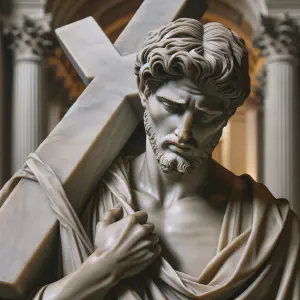Foundations of Faith and Love



The climax of Thomas’ spiritual journey resonated with the message in Luke 14:25-33. Understanding the cost of discipleship, he renounced his possessions and desires, focusing solely on following Christ. He knew that to be a true disciple, one must carry their cross and prioritize their faith above all. Thomas’ life became a living example of a tower built on the strong foundation of faith and love, a beacon for all who sought the path of righteousness and the true essence of discipleship.
Five Questions
What does the story “Foundations of Faith and Love” suggest about the role of love in fulfilling God’s law?
The story highlights that love is central to fulfilling God’s law. It draws from Romans 13:8-10, illustrating that by loving our neighbors, we fulfill various commandments. Love, in this context, means doing no harm to others and actively seeking their well-being, which is the essence of the law according to scripture.
How does the character of Thomas in the story embody the teachings of Psalm 112?
Thomas reflects the blessed man described in Psalm 112 through his life of generosity and justice. His fear of the Lord translates into delighting in God’s commands and conducting his affairs with righteousness. He lends to those in need, mirroring the Psalm’s description of a gracious, just, and merciful man, thus embodying the spirit of the Psalm.
In the face of trials and insults, how does the story interpret 1 Peter 4:14?
The story interprets 1 Peter 4:14 through Thomas’s resilience and unwavering faith amidst trials. It suggests that when we are insulted for the name of Christ, we are blessed, as the Spirit of God rests upon us. Thomas faces scorn for his faith, yet he perceives these challenges as opportunities to strengthen his commitment to Christ, demonstrating the blessings of enduring in faith.
What does the story convey about the cost of discipleship, as mentioned in Luke 14:25-33?
The story conveys that true discipleship, as illustrated in Luke 14:25-33, requires significant sacrifices and a deep commitment. It shows that being a disciple of Christ involves more than just belief; it necessitates renouncing possessions and desires, and prioritizing faith above all, including familial and personal attachments. It emphasizes the importance of understanding and accepting the costs involved in following Christ.
How does Thomas’s life in the story serve as a practical example of the scriptural teachings discussed?
Thomas’s life serves as a practical example by demonstrating how scriptural teachings can be lived out daily. His generosity, love for neighbors, resilience in faith, and prioritizing his spiritual journey over worldly possessions illustrate how the teachings from Romans, Psalms, and Luke can manifest in a person’s life. His actions show how one can embody the essence of these scriptures, making them a living testimony to their truth and relevance.
Bible Study
Romans 13:8-10
Brothers and sisters:
Owe nothing to anyone, except to love one another;
for the one who loves another has fulfilled the law.
The commandments, You shall not commit adultery;
you shall not kill;
you shall not steal;
you shall not covet,
and whatever other commandment there may be,
are summed up in this saying, namely,
You shall love your neighbor as yourself.
Love does no evil to the neighbor;
hence, love is the fulfillment of the law.
This passage, written by the Apostle Paul, emphasizes love as the fulfillment of the law. Paul, a key figure in the early Church known for his missionary journeys and theological writings, teaches that loving others encapsulates all commandments. This aligns with Catholic values by reflecting Jesus’ teaching on the greatest commandment and the importance of love in the Christian life. It upholds the essence of the Ten Commandments and the New Law of Christ, underscoring that acts of love are intrinsic to living out the faith.
Psalm 112:1b-2, 4-5, 9
R. ( 5a) Blessed the man who is gracious and lends to those in need.
or:
R. Alleluia.
Blessed the man who fears the LORD,
who greatly delights in his commands.
His posterity shall be mighty upon the earth;
the upright generation shall be blessed.
R. Blessed the man who is gracious and lends to those in need.
or:
R. Alleluia.
He dawns through the darkness, a light for the upright;
he is gracious and merciful and just.
Well for the man who is gracious and lends,
who conducts his affairs with justice.
R. Blessed the man who is gracious and lends to those in need.
or:
R. Alleluia.
Lavishly he gives to the poor;
his generosity shall endure forever;
his horn shall be exalted in glory.
R. Blessed the man who is gracious and lends to those in need.
or:
R. Alleluia.
Psalm 112, part of the Hebrew Psalter traditionally attributed to King David, celebrates the virtues of the God-fearing man. It aligns with Catholic values of generosity, justice, and mercy. The Psalmist’s portrayal of a righteous person who delights in God’s commands and aids the poor resonates with the Catholic emphasis on the Corporal Acts of Mercy and the Beatitudes. This passage underlines the Catholic teaching that righteousness and compassion are essential aspects of living a life of grace and faithfulness to God.
Luke 14:25-33
Great crowds were traveling with Jesus,
and he turned and addressed them,
“If anyone comes to me without hating his father and mother,
wife and children, brothers and sisters,
and even his own life,
he cannot be my disciple.
Whoever does not carry his own cross and come after me
cannot be my disciple.
Which of you wishing to construct a tower
does not first sit down and calculate the cost
to see if there is enough for its completion?
Otherwise, after laying the foundation
and finding himself unable to finish the work
the onlookers should laugh at him and say,
‘This one began to build but did not have the resources to finish.’
Or what king marching into battle would not first sit down
and decide whether with ten thousand troops
he can successfully oppose another king
advancing upon him with twenty thousand troops?
But if not, while he is still far away,
he will send a delegation to ask for peace terms.
In the same way,
everyone of you who does not renounce all his possessions
cannot be my disciple.”
This Gospel passage by Luke, a companion of Paul and the author of the Acts of the Apostles, records Jesus’ teachings on the cost of discipleship. Jesus emphasizes that following Him requires total commitment, even above familial ties. This aligns with Catholic values by illustrating the importance of total surrender to God’s will, as seen in the vows of religious life and the universal call to holiness. It echoes Catholic teachings on detachment from material possessions and underscores the necessity of carrying one’s cross as part of the Christian journey, highlighting the role of suffering and sacrifice in the process of sanctification and grace.
Lessons
These passages teach us the profound importance of love as the fulfillment of God’s law, the blessings that come from living a life of generosity and justice, and the demands of true discipleship in Christ. They remind us that our faith must be deeply rooted in love, characterized by giving to those in need, and resilient in the face of trials. Embracing the path of discipleship requires us to understand and accept the costs, carrying our cross with a heart full of faith, and prioritizing our spiritual journey above worldly possessions and attachments.
Meditation Prayer


